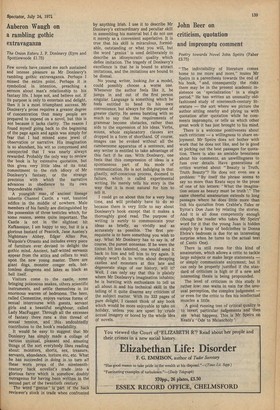Auberon Waugh on a rambling gothic extravaganza
The Onion Eaters J. P. Donleavy (Eyre and Spottiswoode £1.75) Few novels have caused me such sustained and intense pleasure as Mr Donleavy's rambling gothic extravaganza. Perhaps I missed the entire point. Perhaps it is symbolical in intention, preaching a sermon about man's relationship to his fantasy life. I hope not, and believe not. If its purpose is only to entertain and delight, then it is a most triumphant success. Mr Donleavy's prose requires a greater degree of concentration than many people are prepared to expend on a novel, but this is not because it lacks clarity. The reason I found myself going back to the beginning of the page again and again was simply for fear that I had missed some jewel of observation or narrative. His imagination is so abundant, his wit so compressed and unexpected that I was nearly always rewarded. Probably the only way to review the book is by extensive quotation, but this gives very little idea of its total commitment to the rich idiocy of Mr Donleavy's fantasy, or the strange precision with which the narrative advances in obedience to its own Imponderable rules.
A youngish man, of ancient lineage inherits Channel Castle, a vast, haunted edifice in the middle of nowhere. Male members of his family are distinguished by the possession of three testicles which, for some reason, seems quite important. The Castle is not in the slightest bit Kafkaesque, I am happy to say, but it is a glorious bastard of Peacock, Jane Austen's Nightmare Abbey, Edgar Allan Poe, Walpole's Otranto and includes every piece of furniture ever devised to delight the gothic mind. Ancient, half-witted servants appear from the attics and cellars to wait upon the new young master. There are giant dogs, monster conger eels, bottomless dungeons and lakes as black as hell itself.
Visitors come to the castle, some bringing poisonous snakes, others scientific instruments, and settle themselves in its enormous warren of bedrooms. The hero, called Clementine, enjoys various forms of sexual intercourse with guests, servant girls and a beautiful neighbour, called Lady MacFugger. Through all the excesses of fantasy there runs a thin thread of sexual tension, and this undoubtedly contributes to the book's readability.
It would be easy to suggest that Mr Donleavy has simply made a collage of various unusual, pleasant and amusing things of the sort everybody likes reading about: monsters, shorts, sex, treasure, servants, abundance, torture etc, etc. What he has succeeded in doing is to turn all these worn props of the nineteenth century hack novelist's trade into a glorious farce which is somehow doubly outrageous for having been written in the second part of the twentieth century.
The word 'genius' is 'part of the hack reviewer's stock in trade when confronted by anything Irish. I use it to describe Mr Donleavy's extraordinary and peculiar skill in assembling his material but I do not use it merely as a convenient superlative. It is true that his skill is miraculous, formidable, outstanding or what you will, but the word ' genius ' is used deliberately to describe an idiosyncratic quality which defies imitation. The tragedy of Donleavy's excellence is that he is bound to attract imitations, and the imitations are bound to be dismal.
No young writer, looking .for a model, could possibly choose a worse one. Whenever, the author feels like it, he jumps in and out of the first person singular. Language is something which he feels entitled to bend to his own convenience, but always for the purpose of greater clarity. He seems bursting with so much to say that the requirements of grammar become obstacles, rather than aids to the expression of his ideas. Verbs, nouns, whole explanatory clauses are dropped in a form of shorthand. Of course, images can be evoked without all the cumbersome apparatus of a sentence, and any writer is entitled to take advantage of this fact if he can. With Donleavy, one feels that this compression of ideas is a spontaneous part of his mode of communication. He is not indulging in that ghastly, self-conscious process, doomed to failure, which is called experimental writing. He merely tells his story in the way that it is most natural for him to tell it.
I could go on about this for a very long time, and will probably have to do so because there is very little to say about Donleavy's book except that it makes a thoroughly good read. The purpose of writing is surely to communicate your ideas as briefly, as vividly and as accurately as possible. The first prerequisite is to have something you wish to say. What Mr Donleavy has to say is, of course, the purest nonsense. If he were the tiniest bit less talented, one would send it back to him and tell him to try again. It simply won't do to write about decaying castles and monsters at this late and degenerate stage of our history, will it? Well, I can only say that this is plainly where Mr Donleavy's imagination inhabits; he is bursting with enthusiasm to tell us all about it and his technical skill in the telling of it quite disarms any criticism of the subject matter. With its 333 pages of pure delight, I cannot think of any book which would be more enjoyable to take on holiday, unless you are upset by crude sexual imagery or bored by the whole idea of novels.










































 Previous page
Previous page